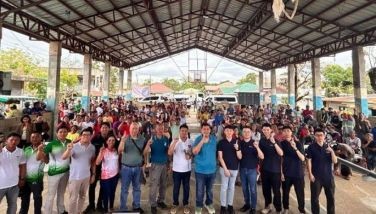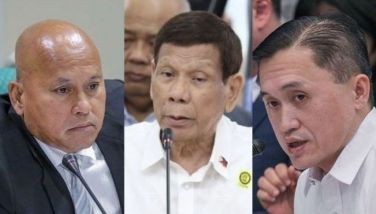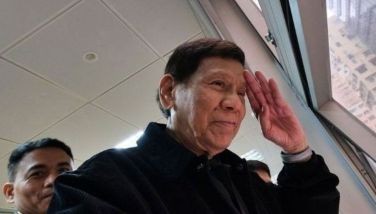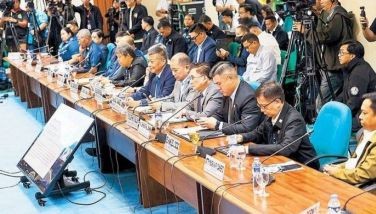Philippine Offshore Gaming Operators
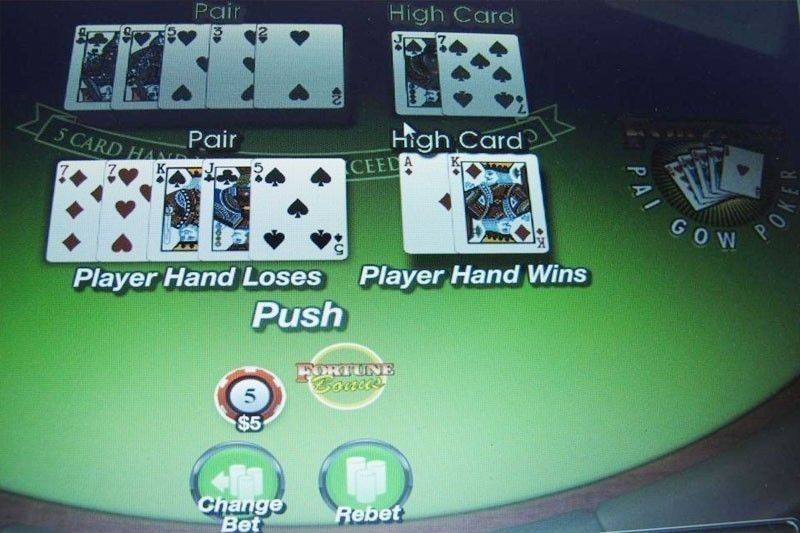
The government should continue its crackdown on illegal offshore gambling operations in the country, Rep. Eric Go Yap (ACT-CIS party-list), vice chair of the House Games panel and who supports the resumption of operations of Philippine Offshore Gaming Operators, says.
Referring to the the illegal gambling operators as NOGOs (Non-registered Offline Gaming Operations), Yap says the recent arrest of 265 Chinese people at an illegal gambling operation in Las Piñas City "should serve as a warning to those in underground operations and those who are planning to do so."
He adds in comments meant for the illegal gambling operators: "You have no business being in our country, literally and figuratively speaking." — The STAR/Artemio Dumlao
The Association of Philippine Offshore Gaming Operators and Service Providers welcomes arrests in Makati and Parañaque of people involved in illegal online gambling as it stresses that its members follow the law.
"We do not condone, abet, or tolerate any form of these illegal operations. Their existence prejudices the interests of legitimate POGO operators subjecting our members to unfair criticisms," the group says.
The government has decided to allow POGOs to resume operations, subject to quarantine restrictions, saying they are, as far it is concerned, business process outsourcing firms.
"We reiterate our commitment to comply with the conditions set by Malacañang, PAGCOR and the Inter-Agency Task Force on Emerging Infectious Diseases (IATF) to ensure everyone’s safety," the association says.
Sen. Risa Hontiveros, who has held hearings on human trafficking and corruption related to the POGOs, asks whether the Philippine Amusements and Gaming Corp. is doing public relations work on behalf of the offshore gambling operators after Pagcor took out newspaper ads defending them.
"PAGCOR is a regulatory body. Why is it lobbying for the POGO industry?" Hontivers says on her Twitter account.
"Nakakabahala na mukhang may intent to dismiss the investigations the Senate has done with regard to POGOs' links to prostitution, human trafficking, and money laundering!" she also says.
"Sana ginamit nalang ang perang pinanggastos sa ad para sa COVID-19 response natin."
Philippine Offshore Gaming Operators as a sector pledged P150 million to assist in efforts against COVID-19, the Philippine Amusement and Gaming Corp. says at a press briefing.
Andrea Domingo, CEO of PAGCOR, says P90 million of the total aid from POGOs is set for medical supplies while the remaining P60 million is for the purchasing and delivery of food to communities affected by the Luzon lockdown.
Philippine Offshore Gaming Operators, gaming stations, poker clubs and other gaming outlets in Metro Manila will be closed, Philippine Amusements and Gaming Corp. chairperson Andrea Domingo tells Superadyo dzBB.
Privately-owned gambling outlets have until midnight to shutter operations.
She says the gaming stations will remain closed until the end of the community quarantine in Metro Manila.
Gaming stations and operations in areas outside the National Capital Region that have declared community quarantines will also be closed.
"POGO workers will be confined to their quarters at doon lang sila puwedeng mag-work from home," Domingo also says.
She says PAGCOR will allow POGOs to operate with a skeletal workforce, provided that the staff will be ferried to and from their workplaces in buses.
POGO workers who disobey the guidelines will have their passports cancelled and will be deported.
Statement by the Spokesperson of the Chinese Embassy in the Philippines
(March 4, 2020)
In response to recent media reports that Chinese citizens in the Philippines are involved in money laundering and illegal pornography, the spokesperson of the Chinese Embassy in the Philippines hereby issues the following statement:
The Chinese government attaches great importance to combating all kinds of illegal and criminal activities and has been maintaining close cooperation with the relevant agencies of Philippine government on cracking down transnational crimes, which has produced fruitful results.
The Chinese Embassy has always been committed to safeguarding the legitimate rights and interests of Chinese citizens in the Philippines and has been providing consular service and protection for them to the best of its ability.
The Embassy is willing to continue to strengthen communication and cooperation with the Philippine side in this regard.
The Chinese Embassy firmly opposes any irresponsible remarks based on fake news and condemns any groundless allegations against China out of ulterior political motives.
Individual illegal and criminal cases involving Chinese citizens are only isolated incidents and cannot represent the whole picture of China-Philippines relations.
The China-Philippines relations have maintained a good momentum of development, which serves the fundamental interests of the two peoples. China is willing to work with the Philippines to push the comprehensive strategic cooperation to a new level.
The Chinese Embassy, in transcribed comments, says China's Ministry of Public Security "has obtained a list of Chinese nationals suspected of committing long-term telecommunication fraud crimes abroad, who are classified as the persons prohibited from exiting China according to the Exit-Entry Administration Law of the People's Republic of China."
"Such operations are aimed at the suspects of Chinese nationals who have committed telecommunications fraud crimes in different countries," it also says.
According to China's Exit-Entry Administration Law, "Chinese citizens who exit or enter China shall, in accordance with the law, apply for passports or other travel documents."
The same law holds that
Under any of the following circumstances, Chinese citizens are not allowed to exit China:
(1) Hold no valid exit/entry documents, or refuse or evade border inspection;
(2) Are sentenced to criminal punishments, the execution of which have not been completed, or are suspects or defendants in criminal cases;
(3) Are involved in unsettled civil cases and not allowed to exit China upon decision of the people’s courts;
(4) Are subject to criminal punishment for impairing border administration, or are repatriated by other countries or regions due to illegal exit from China, illegal residence or illegal employment, and the No-Exit-from-China period has not expired;
(5) May endanger national security or interests, and are not allowed to exit China upon decision by competent departments under the State Council; or
(6) Other circumstances in which exit from China is not allowed in accordance with laws or administrative regulations.
The remarks were released after media reports that China had cancelled the passports of its nationals who have been working in Philippine Offshore Gaming Operators.
"The Chinese Government always requires Chinese citizens overseas to abide by local laws and regulations and not to work illegally in foreign countries. The Chinese Embassy in the Philippines has repeatedly issued consular reminders and has been keeping close communications with the Philippine government in this regard," it also says.
President Rodrigo Duterte has relieved all officials and employees of the Bureau of Immigration allegedly involved in the "pastillas" bribery scheme, where bureau personnel escort Chinese nationals through immigration proceedings.
He says the scheme is "a grave form of corruption" that government will not tolerate.
The supposed scheme was brought to light in hearings into human trafficking related to the rise of Philippine Offshore Gaming Operators in the country.
The Senate Committee on Women, Children, Family Relations and Gender Equality is holding hearing into prostitution rings that cater to Philippine Offshore Gambling Operator workers.
"Carina", a resource person and former victim of the sex ring, says among the youngest that she worked with was just 14 years old.
After the Office of the Solicitor General said the P200-billion industry of POGOs are not subject to Philippine taxes, the House ways and means committee approves a bill imposing 5% franchise tax on the gaming operations mainly run by Chinese workers.
The House bill also proposes a 25% withholding tax on POGO workers earning at least P600,000 annually, reports The STAR's Edu Punay.
The National Bureau of Investigation arrests a Chinese POGO operator and two Chinese nationals in a sting for renting four hotel rooms in Pasay to prostitute Chinese women.
Their syndicate caters exclusively to Chinese POGO operators, reports The STAR's Marc Jayson Cayabyab.
State investigators say the proliferation of Chinese prostitution rings coincided with the boom of POGOs in the country.
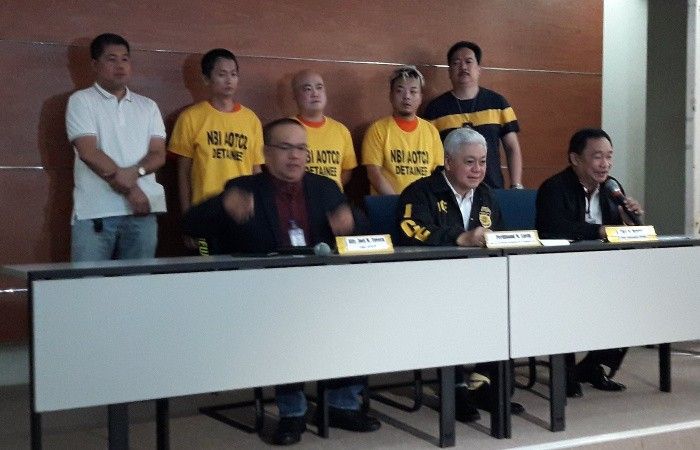
Labor alliance Trade Union Congress of the Philippines is urging government to create a coordinating body for the offshore gaming sector as it expressed concern over more Chinese workers coming to the country after Cambodia banned gaming operations and launched a crackdown on online casinos.
TUCP says it is anticipating the migration of these displaced operators and thousands of Chinese workers into the Philippines.
"While we are assessing the POGO overall social implications and weigh the comprehensive benefits of this online gambling industry in our economy by putting on hold issuance of new operating licenses, (we) would like to propose the creation of a POGO coordinating body that has supervision and control of the industry for the benefit of the country," TUCP president Raymond Mendoza says.
TUCP says it is conducting a study and assessment of the overall impact and trends in POGO industry particularly its economic and social implications in the community including the employment, living and working conditions of Chinese POGO workers in the country — The STAR/Artemio Dumlao
Sen. Francis Panglinan says China's call to prohibit online gambling—gambling is illegal in China while POGOs are said to employ at least 130,000 Chinese nationals and cater to Chinese players—in the Philippines is a good suggestion.
"China is correct here. Cancel the POGO licenses on concerns of criminality and corruption. Gambling is illegal in China. This means that Chinese criminals run the POGOs here in the Philippines," Pangilinan says in a press statement.
"It is the Philippine government that is condoning the operations of criminal syndicates," he says.
Online gaming in the Philippines is licensed by the Philippine Amusements and Gaming Corp. but the Chinese Embassy has said that "according to the Chinese laws and regulations, any form of gambling by Chinese citizens, including online-gambling, gambling overseas, opening casinos overseas to attract citizens of China as primary customers, is illegal."
Detained Sen. Leila de Lima asks the Duterte administration to heed the warning of the Department of National Defense regarding the proximity of Philippine Offshore Gaming Operators hubs to military camps.
"The government should seriously consider the DND's warning about the POGO's location to our main military installations. I think there's a lot more to it than meets the eye," says De Lima in a news release.
“It’s better to err on the side of caution. It’s even beyond caution, a cause for serious concern. We cannot set aside the possibility that these POGO hubs could be used for illegal activities that could compromise the safety and sovereignty of our country,” she adds.
Senate Minority Leader Franklin Drilon shares Defense Secretary Delfin Lorenzana's concern at the increasing number of Chinese working in Philippine Online Gaming Operators, which they say are near military camps.
"The security aspect is something that we cannot just brush aside. I cannot understand why we cannot have POGO locations farther away from military camps," Drilon says in a CNN Philippines interview.
"Secretary Lorenzana is a competent official and his job is to advise us on matter of security. He has nothing but good interntions. We should defer to him,: he also says.
The Palace earlier Monday says that, according to the president, foreign spies can gather information even if they are not near military installations.
President Rodrigo Duterte is also confident that the government can keep an eye on foreign nationals.
"The president is not worried because we have the intelligence capabulity to know what they are doing," presidential spokesperson Salvador Panelo says.
Sen. Win Gatchalian has filed a resolution for hearings to look into uncollected taxes from foreign workers, including those in the Philippine Offshore Gaming Operators (POGO) industry.
"There is a need to review our capability and enhance our capacity to enforce our tax, immigration, and labor laws to balance the protection we need to accord our people vis-a-vis to the contribution of industries and foreign workers to the country's economic growth," Gatchalian says in a press statement.
He says in the same release that "the significant influx of Chinese POGO workers and the approximately 130,000 individuals not paying taxes to the Philippine government have 'clearly raised red flags on the implementation of our tax, immigration and labor laws.'"
The Phililippine Amusements and Gaming Corp. is "totally missing the point" in its plan to restrict Philippine Offshore Gaming Operations to "hubs" partly over complaints of rude behavior by visiting nationals, Sen. Win Gatchalian says.
"What we want is for POGO operators and their employees to pay the correct taxes and not devour local jobs that are exclusively for our countrymen," he says in a statement.
"The government may be losing an estimated P32 billion in uncollected income taxes a year from some 138,000 foreign workers in POGOs, according to the Department of Finance. Isolating these firms and workers into hubs will not bring additional revenue for the government, nor will it solve the issue of foreigners encroaching on jobs meant for Filipino citizens," he also says.
Foreign Affairs Secretary Teodoro Locsin Jr. has tweeted support for the plan, saying the jobs that Chinese nationals are hired for require knowledge of Chinese languages, which few Filipinos can speak.
The Chinese Embassy notes with "grave concern" a government plan to move Chinese Philippine Offshore Gaming Operators (POGOs) to centralized hubs in Clark, Pampanga and in Kawit, Cavite.
The embassy says in a statement that the move "may infringe on the basic legal rights of the Chinese citizens concerned." The embassy said it "strongly urges the Philippine government to effectively protect the legitimate rights and interests of Chinese citizens in the Philippines."
It adds "according to the Chinese laws and regulations, any form of gambling by Chinese citizens, including online-gambling, gambling overseas, opening casinos overseas to attract citizens of China as primary customers, is illegal."
- Latest
- Trending







